Member Sign In
Login with email and password
No account yet? Register Now
The Link Between Comfort Foods, Endorphins, Serotonin, and Poor Health
Have you ever wondered why you crave that cookie at the end of a stressful meeting? Do you find yourself reaching for something sweet during a great movie or show? If this is you, you're not alone. Research shows emotions drive many people’s eating habits.
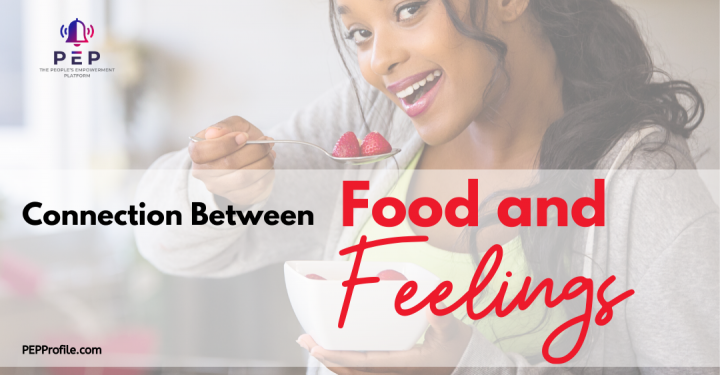
In this discussion, I will review the science and psychology of why we crave certain foods during times of stress, sorrow, and even joy. I'll help you understand why you have a difficult time saying no to high-calorie foods, and give you tools to better manage temptations.
Have you ever craved a carrot or stalk of broccoli in the middle of a stressful day? Probably not, and we know why.
"Studies show that during periods of stress, even make-believe lab stress, we reach for foods high in carbohydrates, particularly simple sugars (Oliver et al.,2000)."
We seek quick sources of fuel when we sense things are going to get tough.
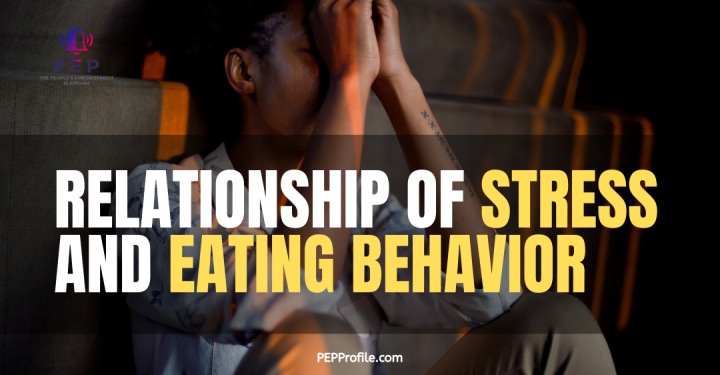
One theory is we inherited this survival mechanism from early ancestors, who needed high energy levels to ward off predators and to prepare themselves for times of food scarcity.
However, people reach for comfort foods even when they are happy, simply seeking additional joy (Wansink et al.,2003).
Conditioning that once supported survival now sustains a complex habit of feeding stress and/or celebration with high-calorie foods. Our emotions play a pivotal role.
We associate “comfort foods” with feelings of consolation or well-being. These foods offer emotional satisfaction that exceeds caloric energy. The problem is that they often tend to have high-calorie content, typically via sugar and/or fats (Wansink et al.,2003).
The foods we consume directly affect how our brains react and the reaction to sugar and fats is an increased desire to consume more of them (Van Oudenhove et al.,2011).
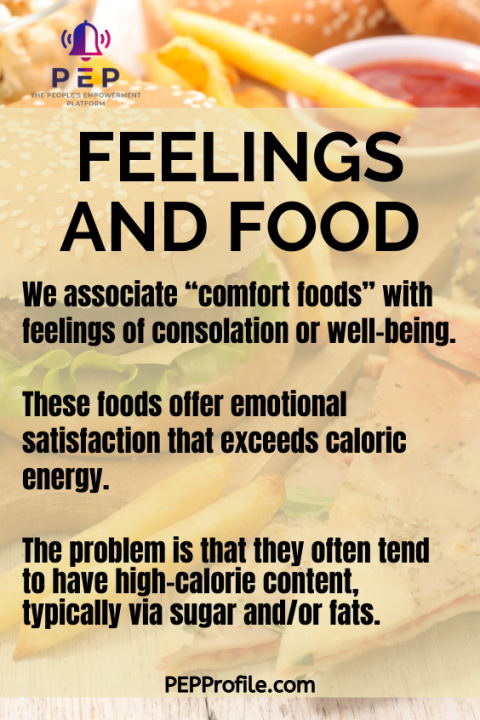
Our brains respond to fats and carbohydrates by releasing dopamine and corticosteroids, which then tell our brains we need to consume more of those types of foods. Stress and repetition exacerbate the vicious cycle.
Americans have easy access to heavily refined and processed food (Oliver et al.,2000), and we use those foods as an ineffective stress management technique. High carbohydrate foods, to some extent, help dull the mental toll of stress, and our bodies seek out protection from the perceived threat by consuming an overabundance of calories (Oliver et al.,2000).
"We get stressed, we eat, we get heavier and more stressed, and the cycle continues".
Where -
Preferred comfort foods vary based on age, gender, and socioeconomic status (Tryon et al., 2015). Comfort foods are also known as “soul food” in the African American community, these foods are typically associated with historically black food in the south (Rose, P.R.,2018). Soul foods are typically cheaper to make and are dense in calories, so they provide the greatest feeling of satisfaction.
The lack of access to fresh foods sometimes referred to as “food deserts,” forces poor urban communities to rely on unhealthy options. These communities thus must turn to more readily available canned and processed foods. Historically in the south, this had included deep-fried foods, rich in fat and cholesterol.
When –
We start making psychological connections and emotional attachments to foods early in life. Our experience reinforces those choices as we turn to foods in times of hardship. Adults with eating disorders typically start these disordered eating patterns early in adolescence, and the behaviors stay with them into adulthood (Neuroscience & Biobehavioral Reviews, 2015). We learn as children the foods we will turn to as adults for comfort.
Why -
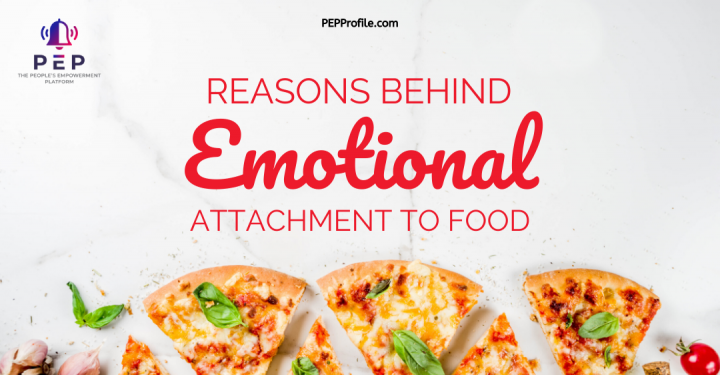
Research indicates sugars and fats interact differently with each person’s brain chemistry. One person can consume the same amount of sugar or fat as another person without having the desire to overindulge (Heath et al.,2006).
A study in the Journal of Neuroscience linked the reliance on comfort foods to the production of serotonin and noradrenaline.
These chemical messengers signal the urge to consume foods and in what quantity. Higher levels of noradrenaline cause us to want to consume more food, while higher serotonin is associated with smaller appetites. Those who handle stress better don’t tend to develop the same additive relationship with food.
Take a moment and think about your coping strategies when confronted with a difficult event or memory. Do you find yourself needing food to cope with emotional work or anxiety?
Park covers a variety of socioeconomic factors that make breaking up with comfort food a difficult task. The economics of healthy eating can’t be denied. Eating healthy foods simply costs more. Purchasing and preparing foods that are not loaded with saturated fats and carbs costs time and money, something the poor don't have at their disposal.
Cultures around the world have their chosen comfort foods with which they will not easily part ways, even knowing the potential health risks. The emotional connection these foods have to the past is too strong to give up altogether.
The greatest challenge facing health advocates around the country is a simple fact; there is a lack of quality education to help people make educated decisions about diet. There is very little nutritional education provided in public schools or communities, so healthy eating practices are not passed on as a skillset.
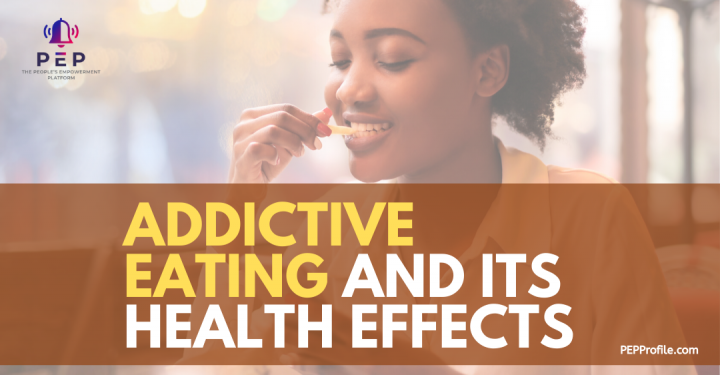
The long-term impacts of emotional eating are suspected to be a major contributing factor to obesity and its secondary health concerns facing most Americans. The research is ongoing, but the link between poor stress management and the need to consume high caloric foods seems evident.
The psychological research completed on the matter has not shown a way to completely break from the emotional ties we have with our food. The key, according to fitness experts, is regular exercise and moderation in food.
The American College of Sports Medicine (ACSM), a leading health and fitness research organization, posits that through a healthy diet and regular exercise people can better deal with their stress, weight, and health, without having to break ties with the foods they love.
The ACSM advocates eating a balanced diet of whole foods most of the time and engaging in at least 180 minutes of moderate to light exercise per week to maintain optimal health.
CONCLUSION:
The foods we crave carry more than just calories and grams of sugar. They tend to have an emotional connection with our past. Years of mental preconditioning and the cascade of neurochemistry that occur after consuming high-calorie foods result in satisfaction.
Research has shown these foods stimulate more serotonin to be released in the parts of the brain associated with emotional regulation: the “reward centers.”
Despite the temporary pleasant feelings that comfort food brings us, we need to remember that these foods should be consumed sparingly and reserved for special occasions. They tend to be very calorically dense and are known to be contributing factors in metabolic diseases such as diabetes, high cholesterol, and obesity.
Knowing that stress will push us to seek out these foods, we need to make a concerted effort to manage our daily stresses and make health-conscious choices.
What foods do you find yourself reaching for at the end of a long day or when things are going great and you want to celebrate? Do you reach for that Carmel Frappuccino or do you prefer a bag of carrots? Will you think twice now that you know the addictive nature of foods high in sugar or fat? Or is a good time worth celebrating? Leave your answers in the comment box below.
Thank you for being a part of PEP Profile Community. If you’re not yet a member but would like to join the discussion you can request an invite at PEPPROFILE.COM
References
Cardi, Valentina, Jenni Leppanen, and Janet Treasure. "The effects of negative and positive mood induction on eating behavior: A meta-analysis of laboratory studies in the healthy population and eating and weight disorders." Neuroscience & Biobehavioral Reviews 57 (2015): 299-309.
Heath, Tom P., et al. "Human taste thresholds are modulated by serotonin and noradrenaline." Journal of Neuroscience26.49 (2006): 12664-12671.
Matthew S. Tryon, Kimber L. Stanhope, Elissa S. Epel, Ashley E. Mason, Rashida Brown, Valentina Medici, Peter J. Havel, Kevin D. Laugero, Excessive Sugar Consumption May Be a Difficult Habit to Break: A View From the Brain and Body, The Journal of Clinical Endocrinology & Metabolism, Volume 100, Issue 6, 1 June 2015, Pages 2239–2247, https://doi.org/10.1210/jc.2014-4353
Oliver, Georgina, Jane Wardle, and E. Leigh Gibson. "Stress and food choice: a laboratory study." Psychosomatic medicine62.6 (2000): 853-865.
Rose, P.R. (2018). Health Disparities, Diversity, and Inclusion: Context, Controversies, and solutions.
Van Oudenhove, Lukas, et al. "Fatty acid-induced gut-brain signaling attenuates neural and behavioral effects of sad emotion in humans." The Journal of clinical investigation 121.8 (2011): 3094-3099.
Wansink, Brian, Matthew M. Cheney, and Nina Chan. "Exploring comfort food preferences across age and gender." Physiology & behavior 79.4-5 (2003): 739-747.
Joseph E. Donnelly, Steven N. Blair, John M. Jakicic, Melinda M. Manore, Janet W. Rankin, Bryan K. Smith, American College of Sports Medicine
Med Sci Sports Exerc. 2009 Feb; 41(2): 459–471. doi: 10.1249/MSS.0b013e3181949333
Login with a social network